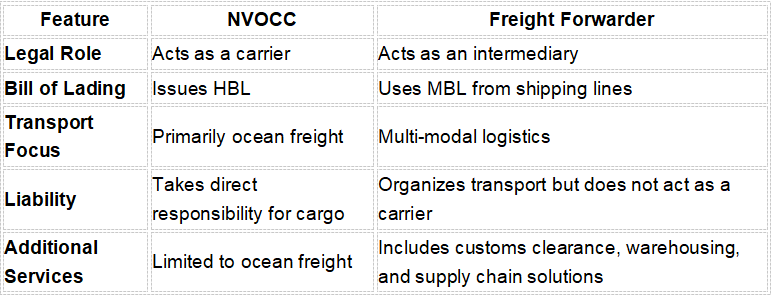When it comes to international logistics, NVOCCs (Non-Vessel Operating Common Carriers) and Freight Forwarders play crucial roles in ensuring cargo moves smoothly across borders. However, businesses often struggle to determine which service provider best fits their shipping needs. This article explores how each operates, their legal responsibilities, and how they influence global trade.
1. What is an NVOCC?
An NVOCC is a company that acts as a carrier without owning vessels. Instead, it leases cargo space from shipping lines, consolidates shipments, and issues House Bills of Lading (HBLs) to customers. NVOCCs play a significant role in ocean freight logistics by ensuring efficient container utilization and cargo management.
Key Features of an NVOCC:
· Functions similarly to a shipping carrier but does not own vessels.
· Issues its own House Bill of Lading (HBL), which can be used for cargo release.
· Primarily focuses on ocean freight services, including FCL (Full Container Load) and LCL (Less than Container Load) shipments.
· May have regulatory obligations in certain regions, requiring specific licenses.
NVOCCs are often chosen by businesses that need a dedicated ocean freight partner for regular shipments.
2. What is a Freight Forwarder?
A Freight Forwarder is a logistics specialist that arranges cargo movement across multiple modes of transportation. Unlike an NVOCC, a freight forwarder does not act as a carrier but instead coordinates with various transport providers, handling everything from customs clearance to warehousing and cargo insurance.
Key Features of a Freight Forwarder:
· Acts as an intermediary between shippers and carriers.
· Offers multi-modal transport solutions (sea, air, rail, and road).
· Provides additional logistics services such as customs clearance, cargo tracking, and supply chain consulting.
· Uses carriers’ Master Bill of Lading (MBL) instead of issuing its own.
Freight forwarders are ideal for businesses that need comprehensive logistics solutions beyond ocean freight.
3. NVOCC vs. Freight Forwarder – Key Differences

Many logistics providers operate as both an NVOCC and a Freight Forwarder, combining the advantages of both services.
4. Choosing the Right Option for Your Business
· If your business primarily relies on ocean freight, working with an NVOCC ensures direct control over cargo movement.
· If you require a more flexible, full-service logistics partner, a freight forwarder is the better choice.
· Some businesses use both services strategically, depending on shipping routes, cargo volume, and logistics complexity.
Making the right choice depends on your business model, shipment frequency, and the level of logistics support required.
5. Conclusion
Both NVOCCs and freight forwarders are vital players in global trade. While NVOCCs focus on ocean freight and act as carriers, freight forwarders provide end-to-end logistics solutions that cover various transport modes. Understanding their differences allows businesses to optimize shipping strategies and improve supply chain efficiency.






